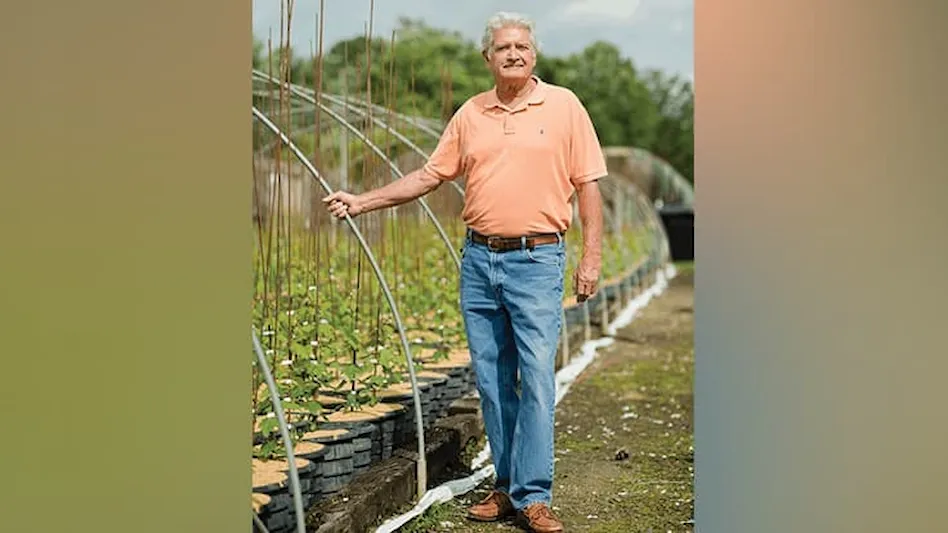
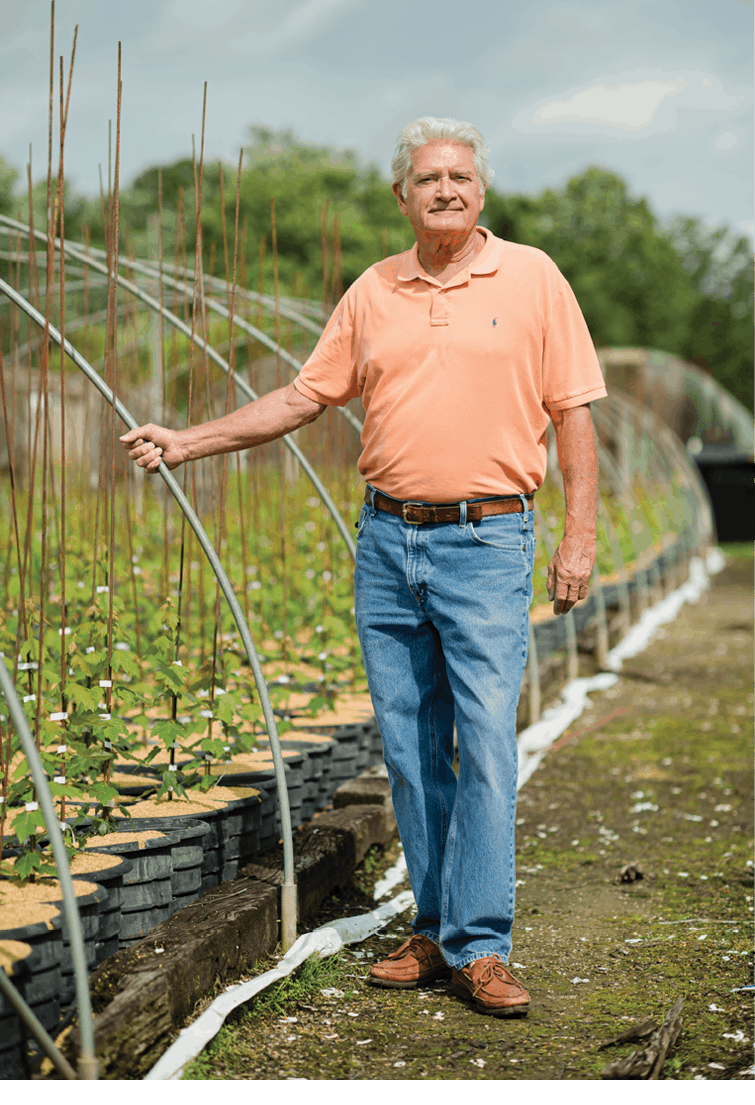
Pleasant Cove Nursery started in 1957 when John R. Collier, Frank’s father, started growing plants in the basement of his Tennessee home. The nursery moved out of the house and into the backyard, and eventually grew into the 500-acre, 20-farm facility it is today. Once staffed solely with Collier family members, Pleasant Cove now employs more than 60 workers during peak seasons.
John and his wife Elma ran the nursery in the early days with their four sons, John Jr., Robert, Frank and David. Frank remembers it was tough in those early days, working as a kid in the fields.
Frank joined up for good after he finished college in the mid-70s. The nursery has changed a lot since then, but so has the industry. And the Colliers have always been able to adapt, whether it meant applying new research and technology or engineering a new solution.
“We’ve still got the first 'vineyard' tractor probably in the state of Tennessee,” Frank laughs, “A Bungartz. It was a vineyard narrow tractor, with a Volkswagen engine. You see all kinds of them now, but a bit innovative for nursery use when we got it. I had a guy auditing us once and he wanted to know why this or that and I said, ‘Look, they don’t make things for nurserymen.’”
That’s changed a bit, with Bouldin & Lawson just down the road making equipment to help the nursery industry automate. The Collier family still runs Pleasant Cove. Although John Jr. died in 2019, Robert, Frank and David carry on the Collier legacy of excellent nursery stock. The family always made it a point to have ties with regional, state and national trade associations like The Middle Tennessee Nursery Association, Tennessee Nursery and Landscape Association, Southern Nursery Association and AmericanHort. Frank has served in various capacities and has become known as a champion of research, including a stint as president of the Horticultural Research Institute. In 2011, Frank was inducted into the TNLA Hall of Fame.
“Frank has worked tirelessly on funding for HRI with much success,” says Michael Lorance, owner of Cherry Springs Nursery, another Tennessee-based wholesale nursery. “Additionally, he was instrumental in securing funding for the Nursery Research Station in McMinnville, Tennessee and the staffing required to make it the reality it is today.”
From a national perspective, the nursery industry is perpetually overlooked. It’s typically tucked under the agriculture umbrella as “specialty crops,” where it has to fight for every scrap of funding that makes it down through the Farm Bill.
“One of our old researchers, retired now, says ‘If you’re not sows, plows and cows, you don’t count in the state of Tennessee’ — and most likely any other state,” Frank says.
Frank is well-equipped for that fight for funding. He’s been doing it a while. Craig Regelbrugge, senior vice president for government relations at AmericanHort, has known Frank for 30 years and sees him as a kindred spirit — someone able to speak the language of politics, understand the systems in place, and willing to use them to carve out a piece for the nursery industry.
“Frank is one of the most politically astute individuals in the industry,” Craig says. “In an old-school way, but I mean that positively. He’s all about relationships and quiet but effective influence.”
Craig sees the research center as a large part of Frank’s legacy as a nurseryman who understands the value of research and development and wants the industry to keep striving to improve itself.
“He was instrumental in the successful effort to establish the Nursery Crops Research Station at McMinnville, and for that matter, the Floriculture and Nursery Research Initiative, a legacy that has grown in impact and continues on.”
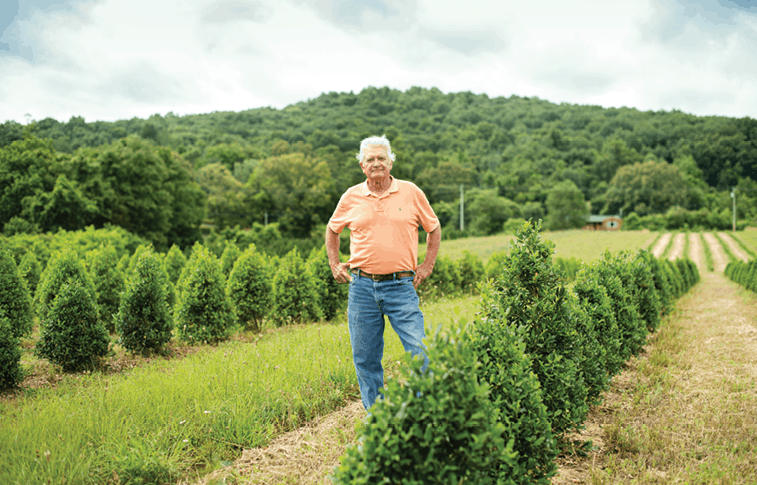
A resource for Tennessee
McMinnville is known as the heart of Tennessee’s nursery country. That makes it an ideal spot for a nursery research station. Built on the 87-acre site of a former commercial nursery, The Otis L. Floyd Nursery Research Center is a facility dedicated to the improvement of the Tennessee nursery crop industry. It is located approximately 80 miles southeast of Nashville on the edge of the Cumberland Plateau.
Through partnerships with the Tennessee nursery industry, Tennessee State University, the USDA, and state and local governments, the necessary political, social and economic support was assembled to construct the research station. In addition to considerable support from the Tennessee nursery industry, the Center has received donations from nursery growers across the U.S.
“We hooked up politically with Dr. Otis Floyd who was chancellor and president at TSU and made it happen,” Frank says. “It’s a good deal for the industry. Plus, it connects all over the country. Oregon, California, Ohio, to Beltsville, Maryland. I’m very proud of that. Hopefully we get these young people to keep it going, keep it funded.”
Construction of the laboratory/administration building began in 1994. The 20,000 square foot building has 10 laboratories, offices for 12 scientists, a 200-seat auditorium, and 12,000 square feet of greenhouse space. Other facilities include a state-of-the-art pesticide mixing and storage facility, a fire ant quarantine facility, soil mixing/composting facility, shade houses, propagation houses, irrigated container yards, a pot-in-pot yard, and an equipment/maintenance shed. The entire site is plumbed for irrigation using either well water or municipal water.
Frank says a nursery advisory group meets with the station’s director to provide input on potential research projects for its scientists.
“Our station is unique in a lot of ways,” Frank says. “It’s got a great staff and a great director. We’ve got Tennessee Department of Ag plant industry inspectors there on the site. We’ve got extension there on the site, which is really good for the scientists to be able to talk to the inspectors and vice versa. It’s a one-stop shop.”
As the Nursery Research Center expands, specialists in other disciplines will be added. The areas that are currently prioritized are agricultural mechanization, pesticide/environmental sciences, applied plant physiology, and additional pathology and entomology programs.
Facilities planned for the future include student housing, storage areas for scientist’s field supplies, increased shade house and greenhouse capacity, and over-wintering structures for containerized field research material.
The Nursery Research Center is only about 20 minutes from Pleasant Cove Nursery. And Frank has made sure his nursery has implemented some of the station’s R&D findings. From the use of cover crops between rows in the field to protection from soilborne diseases and insect pests, to crop improvements in boxwood and viburnum and a hydrangea breeding program, the scientists have completed very useful projects.
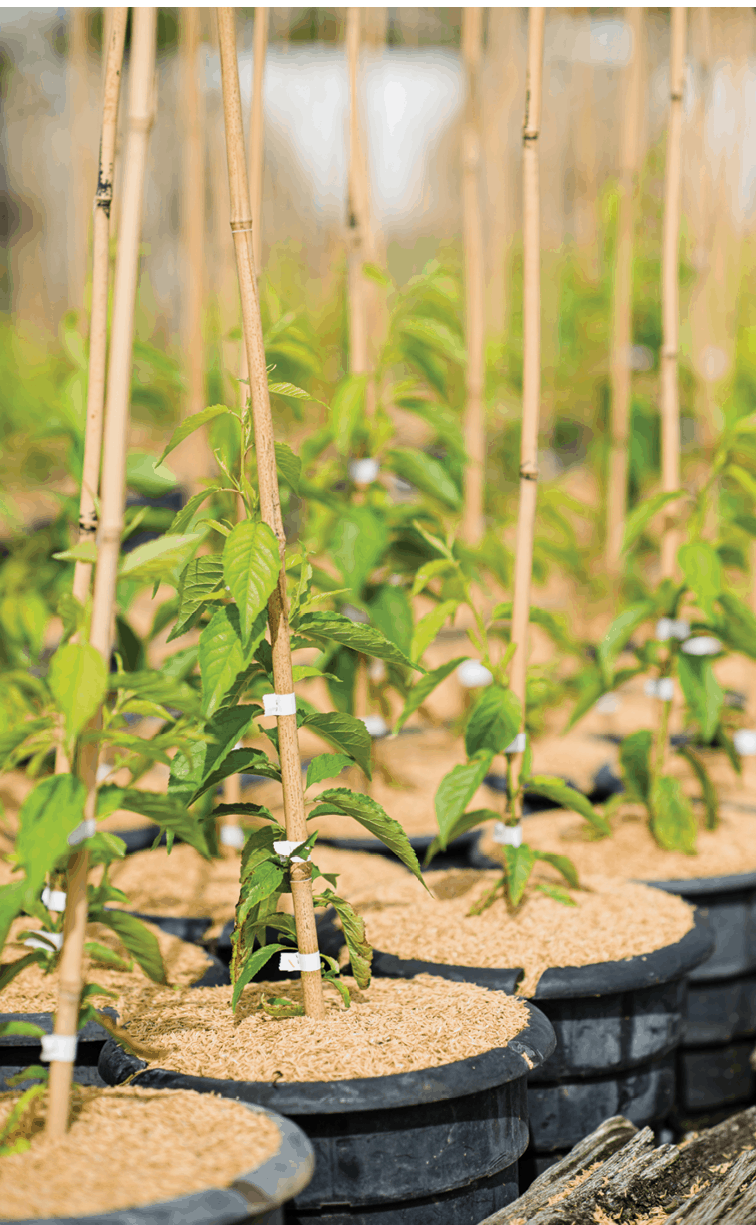
Another collaborative effort
Frank was also one of the key industry forces behind the creation and early growth of the Floriculture and Nursery Research Initiative (FNRI).
In 1996, the American Nursery and Landscape Association (ANLA), the Society of American Florists (SAF) and the Ohio Florists Association (OFA) launched the proposal when they asked U.S. Department of Agriculture - Agricultural Research Services (USDA-ARS) for research help. The resulting partnership has lasted more than 20 years. In March 2018, FNRI received $1 million in funding as part of the spending bill passed by Congress.
Peter K. Bretting, USDA-ARS National program leader for plant genetic resources, is one of nine national program leaders that constitute crop production and protection. He was the lead USDA-ARS researcher for the FNRI from its inception in 1998 until the mid-2000s.
“It was meant from the inception to be sharply focused on the needs of industry,” Peter says. “ARS would handle research, whether it was feasible, how to go about it in terms of scientific approach, and the industry provided input about relevance.”
As the FNRI was being established and thereafter, Peter and the other researchers received guidance from Frank and other industry leaders about the types of projects upon which they should focus their efforts. Those communications were important because they helped ARS know what the most important priorities were for the green industry. It was a collective effort and it grew into a well-functioning partnership.
Frank’s sterling reputation as a nurseryman and collaborator made him the perfect person to coordinate between all the stakeholders in the initiative and ensure everyone was rowing in the same direction.
“He rapidly established himself as a trusted and discreet partner,” Peter says. “Some of the early discussions were quite complicated and had to be dealt with carefully and adeptly. Frank had such a reputation among industry and universities, UT and Tennessee State and with us, that he played a key role in fostering communication so that all the many players in the initiative were aligned along the same effort.”
Some of Frank’s reputation was due to being part of a community of straight shooters: nurserymen who forged substantial deals with a handshake because generations of trust. But he also earned that reputation through his actions and his ability to communicate.
“It’s watching him in action,” Peter says. “If he said he would do something, he would do it in a very capable way. If there wasn’t a clear path to a particular goal, he’d let you know that right away. And collectively we would work on a different approach.”
If the research team ever had a question or hit a snag that involved the green industry crops, their first step was to pick up the phone and talk with Frank to seek his advice on how to proceed. On the other hand, if something potentially controversial or contentious was emerging, they would hear about it early from him.
“He was very good at establishing people as colleagues rather than adversaries,” Peter says. “That was really critical, especially at the beginning of this when there was some misunderstanding or lack of information on what the initiative meant and what its focus was. He was very effective in communicating that to a broad spectrum of industry colleagues and university colleagues too. Of course, he surely promoted the effort in Tennessee, but he was also always looking at the broader picture. He would work on behalf of the more local interests, but the regional and national interests, too. He was really quite selfless in that regard. That contributed to widespread trust of him, his advice and his ideas about how to proceed.”
For many years, Dr. Judy St. John was a high-level official at the USDA-ARS, and the industry’s primary champion for FNRI.
“Frank established a superb relationship with Judy,” Craig Regelbrugge says. “In fact, I can’t swear to this, but he may have been the one to give her the nickname ‘Mother Nature,’ which stuck with her for the rest of her career and to this day.”
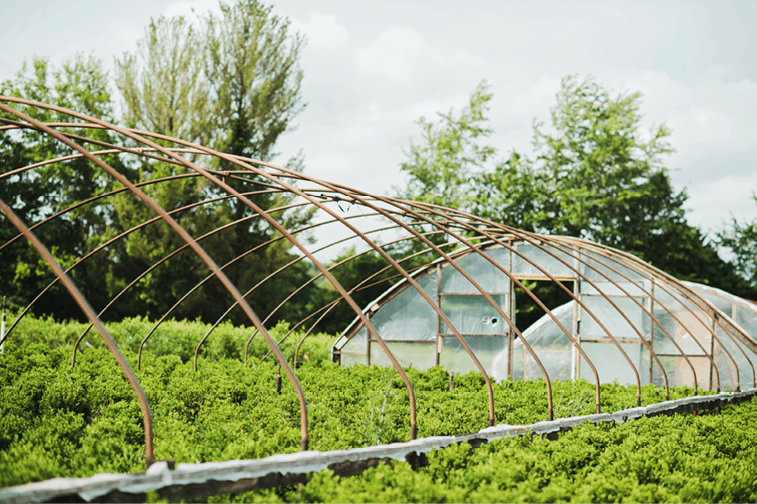

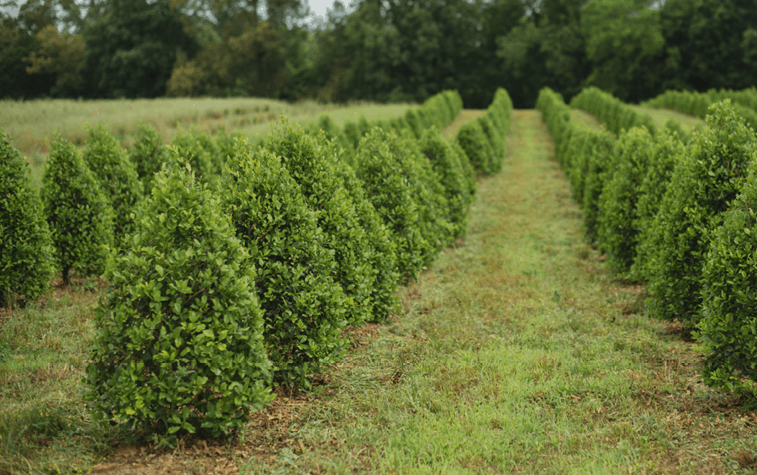
For his part, Frank is thankful to Dr. St. John and the other ARS scientists for all the work they did for the industry.
“She was a keeper,” Frank says. “She’s always helped the small crop growers like us. Judy St. John and ARS have been really good to us on specialty crops funding and research.”
Looking to the future
Frank hopes the next generation of nurserymen will continue the commitment to research that has served the industry well. He also has advice for the next generation.
“Ask a lot of questions,” he says. “Don’t be bashful.”
He also suggests visiting other nurseries in other parts of the country to see how they operate. You can pick up a lot of information that way, and many of the little things are done differently from place to place.
“A friend of mine’s son, he’s a good kid. I told him, ‘Buddy, you need to go to another nursery for a couple years, at least two or three,’” Frank says. “And he went for a year, came back afterwards and said ‘Thank you.’”
The nursery industry’s efforts to honor its past and commit to its own future is easily seen at HRI’s annual meeting each year. Nursery owners in attendance make pledges of substantial funds for research, often in memory of parents or in honor of their children.
“Instead of saying ‘I’m going to buy myself a new boat or motorcycle,’ they’ll say ‘I pledge $50,000 in the name of father, mother or child on behalf of research,’” Peter says. “As a researcher I can’t think of a more committed group of industry folks.”
The Collier family has its own named endowment fund, the Elma E. and John R. Collier Memorial Trust Fund. And Frank has plenty of hope for the future.
“I think this shows, this virus deal, that we’re essential,” he says. “If you’re stuck at home, you can plant some plants, trees, vegetable crops. The whole nation will figure that out sooner or later.”
Still, even in an age of virtual trade shows and video conferences, the skills that make Frank such a successful leader are good as gold.
“The influence Frank had been able to wield, that was interpersonal,” Peter says. “How can you do it in days like these when you can’t look a person clearly in their eye, share a meal or have a drink or two and forge those relationships of strong trust? We haven’t come up with a technological fix for that.”
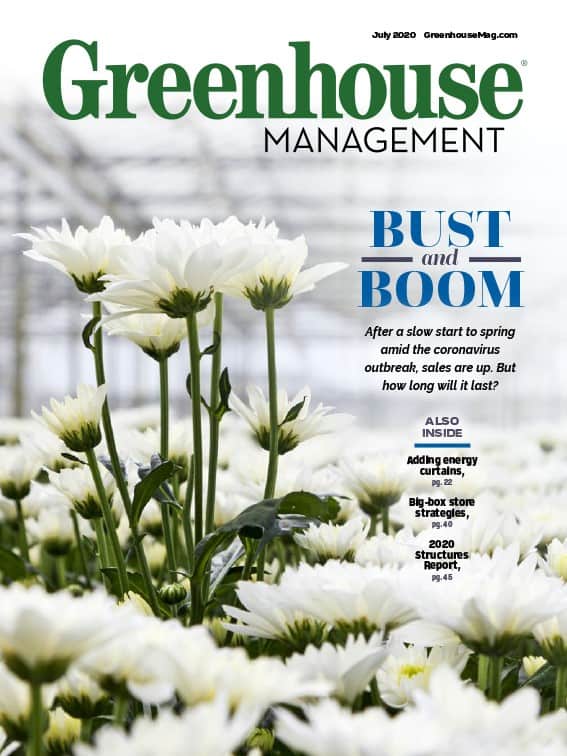
Explore the July 2020 Issue
Check out more from this issue and find you next story to read.
Latest from Greenhouse Management
- Passion grows progress
- Registration opens for Darwin Perennials Day
- U.S. Department of Labor finalizes farmworker protection rule
- Azo Root is now available from Harrell’s
- Bidens ferulifolia Blazing Glory
- Rob Hanifin joins Ridder North America as product specialist for climate screens
- The importance of measuring light
- Spigelia marilandica





